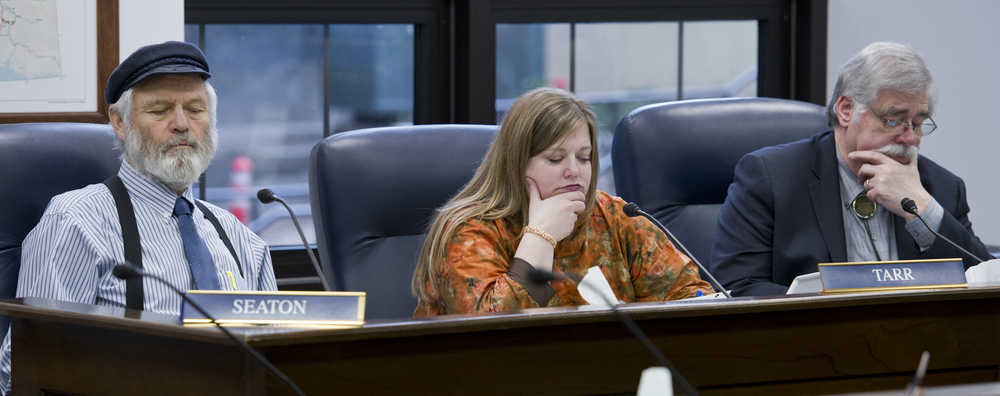Miners opposed to a proposal by Gov. Bill Walker to raise taxes on the state’s top-producing mines got help from an unexpected source Friday afternoon.
Alongside the miners testifying against the tax increase was Graham Neale, director of the center for mine training at the University of Alaska Southeast.
“Now is the time to evaluate how the state can attract investment,” Neale said, explaining that a tax increase might do the opposite.
If mine developers are frightened away from Alaska by higher taxes, that would leave students of his program without jobs. “We could be putting Alaskans on pathways to careers that don’t exist,” he said.
Higher taxes, if they reduce business, could end up reducing state revenue, not increasing it, Neale and others said.
Several members of the Alaska House Resources committee, which was hearing public testimony on House Bill 253, appeared surprised by Neale’s testimony.
“Your testimony is interesting,” said Rep. Andy Josephson, D-Anchorage and a member of the committee. “You could take just that testimony and describe the entire session that way.”
He went on to ask how to balance the fact that an employee of the University of Alaska Southeast, a state-funded institution, was arguing for a decrease in a tax that (as drafted) would earn about $6 million more per year for the state budget.
Neale replied that the mine-training program is primarily funded by donations and gifts from industry, plus federal grants. It receives little state funding, he said.
Neale declined to offer an alternative to the mining tax when prodded by Josephson and Rep. Geran Tarr, D-Anchorage, and he said he wasn’t comfortable talking about whether the higher tax is competitive or not.
After the hearing, Neale said, “basically, my job is to put other people to work. If mining activity or new mines are discouraged, it’s pretty hard to find work.”
For the past several years, Neale has worked as project manager of Niblack, a gold-silver-zinc-copper mine prospect on Prince of Wales Island. With declining mineral prices worldwide, that project has been put on the back burner. Neale also serves as chairman of the Ketchikan/Prince of Wales chapter of the Alaska Miners Association.
He said he doesn’t think his testimony will hurt the mine-training center’s relationship with other UAS departments, which are supported by state funding.
In addition to Neale, 13 others testified for and against the governor’s proposal during the two-hour hearing.
HB 253 would raise the tax rate for the largest mines (those with a net income of $100,000 or greater) from 7 percent to 9 percent. Only 14 mines were in that tax bracket in 2014, according to state records.
The 3½-year tax exemption for new mines would be eliminated, and there would be a fee for tax licenses, something that would affect mines of all sizes.
According to state documents, the existing mining tax collected $38.6 million in 2015. The increase would collect another $6 million per year.
Miners and industry advocates said that sum isn’t worth the harm that would be done to the state by the tax increase.
“This could not have been proposed at a worse time in the past 45 years,” said professional geologist Donald Stevens of Anchorage.
The slowing Chinese economy has meant less demand for minerals, which has deflated global prices and led producers to scale back mining efforts. A tax increase, testifiers said, would exacerbate problems and lead companies to invest in places other than Alaska.
“Alaska competes worldwide for capital, and I saw this firsthand in Anglo-American’s boardroom in London,” said Jason Brune, who was laid off from his job as a spokesman for Pebble Mine after Anglo-American withdrew from the project. He now works for CIRI.
“I was a casualty of higher costs,” Brune said.
Josephson pointed out during the hearing that the mining tax hasn’t changed since 1955, before the Alaska Constitution was written, let alone before Alaska became a state.
“We haven’t changed the tax since right after the Korean War,” he said.
Randy Powelson, a mining engineer now working at a family-owned placer mine, said that doesn’t tell the whole story. The federal and state regulatory burden has risen, even if taxes haven’t.
“Maybe it hasn’t changed since 1955, but I’ll guarantee you that everything else in the world has, and it’s making you uneconomical,” he said.
In response to questioning from Rep. Paul Seaton, R-Homer, Nome placer miner Doug Tweit said a $200,000 lower limit for the top tax bracket might make more sense.
Though most of the comments Friday were against the proposed tax hike, two commenters supported the governor’s proposal.
George Pearce of Kasilof urged committee members to “get the best deal for the Alaskans, not the destroyers of the renewable resources like fish, water, habitat,” while Julia Mickley of the Northern Alaska Environmental Center said “development doesn’t come without a cost, and the public should be compensated for minerals removed from the land.”
The bill was held in committee after the hearing, and committee co-chairman Rep. David Talerico, R-Healy, said people who didn’t testify Friday will get another chance.
“We certainly don’t expect this to be the only public testimony on this bill,” he said.

